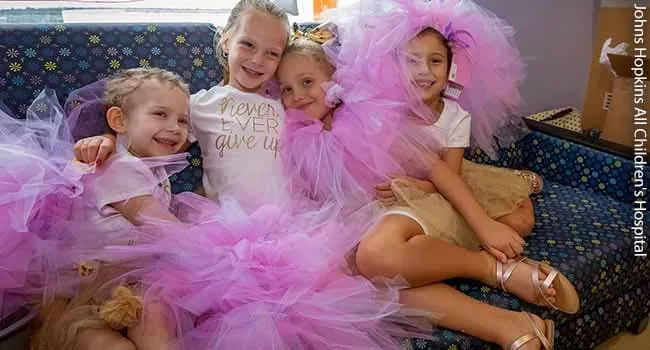Editor’s note: As of Oct. 30, 2019, Lauren Glynn is back in remission after getting successful CAR T-cell therapy. “We are so thankful that Lauren continues to feel well and are very hopeful that this CAR T is her cure,” her mom says.
Sept. 23, 2019 -- Four small friends who met in the hospital while getting cancer treatment are back together for a fourth year of group photos. And the message on their shirts -- “Never EVER Give Up” -- carries an emotional new meaning.
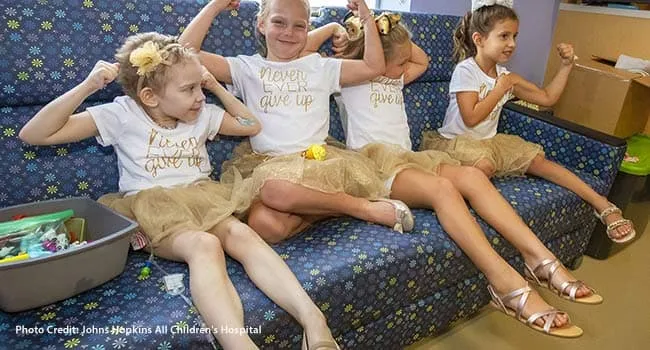
Chloe, Lauren, McKinley, and Ava -- now 5 to 6 years old -- enjoyed a day of hugs, laughs, and playtime earlier this month at Johns Hopkins All Children’s Hospital in St. Petersburg, FL. That’s where they met in 2016. During their time there, they posed for a spur-of-the-moment group picture in tutus, and it’s become an annual tradition for them.
Today, Chloe, McKinley, and Ava are in remission and doing well, a spokesperson for the hospital says. But Lauren’s cancer came back.
This year the four friends spent their reunion in Lauren’s hospital room at All Children’s, where she returned for treatment.
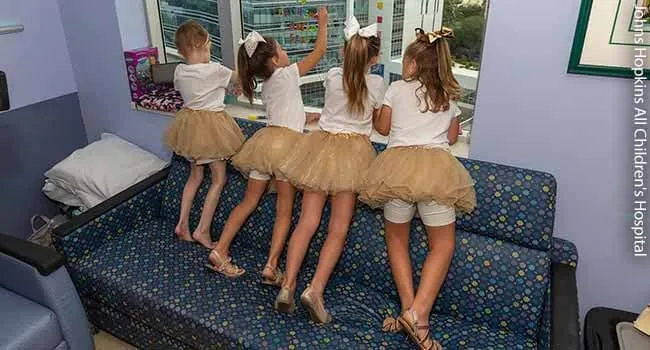
They wore matching shirts that Ava’s mother made, white tees glittering with a mantra inspired by the girls’ own words: “Never EVER Give Up.”
“I heard all the girls start saying it around the time last year when we found out Lauren had relapsed,” says Lauren’s mother, Shawna Glynn. She and her three fellow moms talked and agreed the message was a perfect fit. “The girls have never given up on each other,” Glynn says.
And their reunion this year lifted everyone’s spirits, she says: “Lauren was sitting on the bed when the girls walked in and she was just bouncing up and down because she was so excited to see them. I wanted to pause time and just live in that moment.”
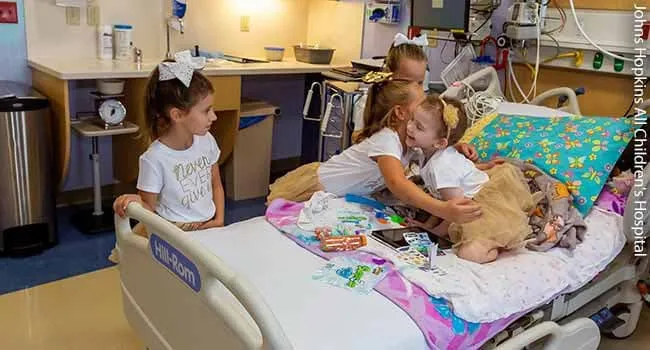
The Search for a Cure
Lauren, a smart and strong-willed 6-year-old who loves to paint, has one of the most common types of childhood cancer: acute lymphoblastic leukemia (ALL). It’s the same kind Ava and McKinley had. It affects the blood and bone marrow, and it often shows up between the ages of 2 and 4. It can bring on symptoms such as bone and joint pain, weakness, and unexplained weight loss. Doctors usually treat it with chemotherapy, and it can be cured. But for 15% to 20% of kids who get treatment for ALL, the cancer will come back.
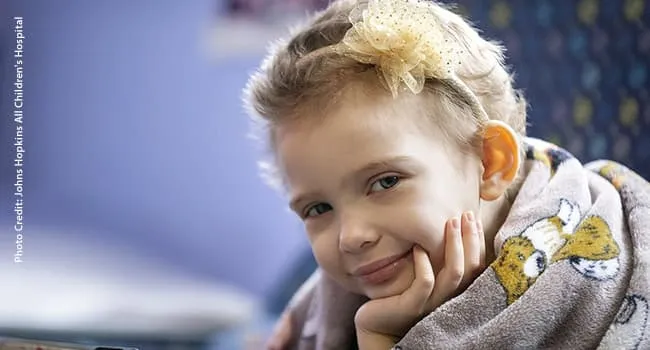
After Lauren’s cancer returned, she got a bone marrow transplant and more chemo earlier this year. She also got a type of immunotherapy treatment that her family hopes will send her disease back into remission: CAR T-cell therapy. Doctors take a type of white blood cell, called T cells, from your blood and change them in a lab, making them more precise at finding and attacking cancer cells. Once doctors put these powered-up cells back into your blood, the cells can latch onto cancer cells and destroy them.
Lauren has felt “really well” since she got the therapy, Glynn says. With her treatment complete, she’ll continue to get regular follow-up care and checkups at the All Children’s outpatient clinic.
“She has paved her own path, and we hope after everything she has been through in the last 3 1/2 years, that this CAR T is her cure,” her mom says.
The Power of Friendship
Last year, when Lauren, Chloe, Ava, and McKinley were all in remission, they donned shirts that said “Survivor.”
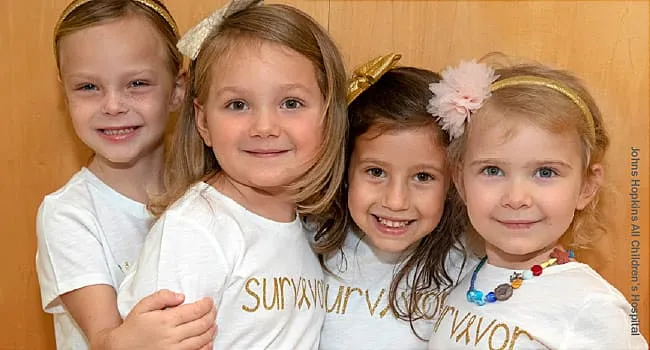
The year before that, they dressed up in gold tutus and wore shirts that said “Brave,” “Strong,” “Fearless,” or “Warrior.”
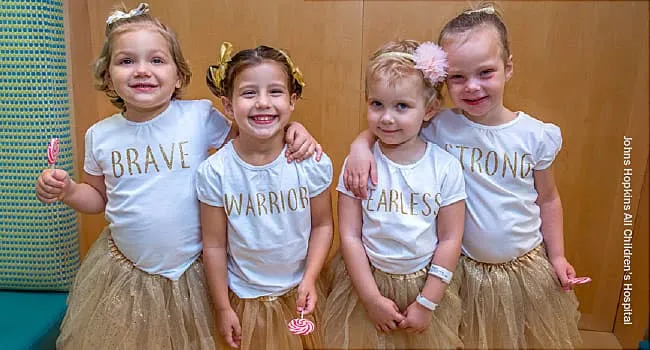
And while they were all going through treatment in 2016, they dressed in shirts that said “Straight Outta Chemo.’”
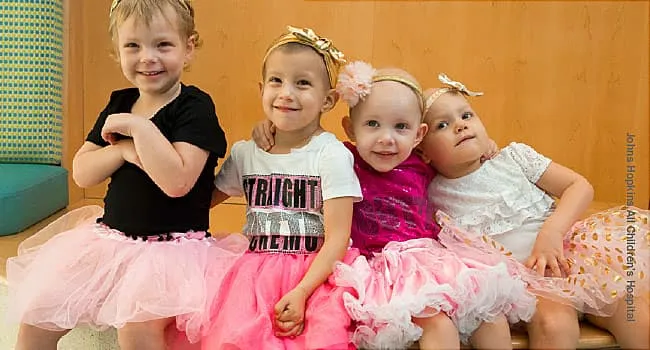
Back then, the friendships their parents formed were also invaluable.
“I was so lucky to have met this amazing group of moms early on in Lauren's leukemia diagnosis,” Glynn says. “I think that your instinct is to close yourself off to the world, because you think that no one could possibly understand what you are going through. But if you strike up a conversation with another parent on the oncology floor, you will quickly realize that you are not alone.”
“We quickly bonded on the hospital floor and in clinic,” says Chloe’s mother, Jacquelyn Grimes. “We networked with other parents and became a support group for each other. We compared stories, treatments, issues, and ideas.”
“It’s a much easier road when you have that support,” Glynn says.
WebMD senior medical director and pediatrician Hansa Bhargava, MD, agrees. “Finding a community is so important in helping kids to get better,” she says. “These friendships really make a difference in emotional healing and recovery from serious disease.”
